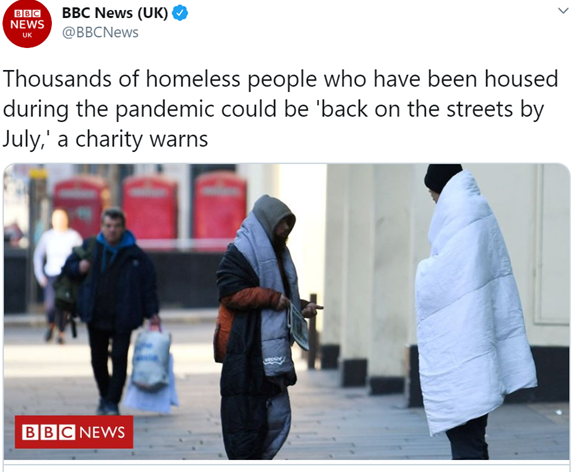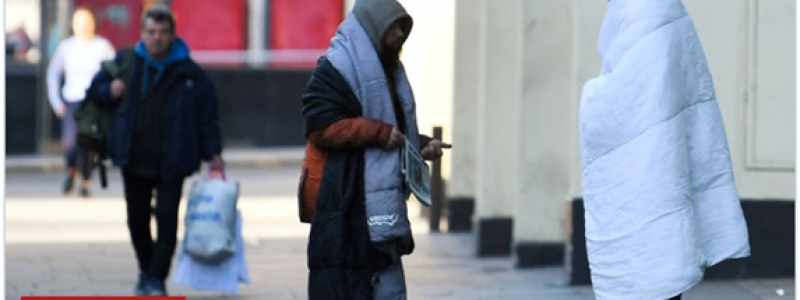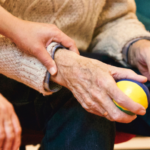This morning I read a BBC headline: “Coronavirus: Thousands of homeless ‘back on streets by July'”.
Tragically, this is neither surprising nor unexpected.
When lockdown measures began to be introduced, local authorities were sent an email on a Wednesday, instructing them to house all rough sleepers by the weekend. There was panic at having to carry out such a mammoth task on such little notice. But, there was also a tangible sense of pride and hope that it was possible to get rough sleepers into safe accommodation so quickly when there was the will to do so.
It was also exciting that the government, which had overseen a 141% rise in rough sleeping since 2010, was finally funding and supporting emergency measures to tackle the issue. When rough sleeping became a humanitarian situation, the government and local authorities had no choice but to spring to action.
This begs the question: Was rough sleeping not a humanitarian emergency before?
Recent government statistics found that in 2018 there were an estimated 726 registered deaths of homeless people in England and Wales. The average age of death for rough sleepers was found to be 44 for men and 42 for women. Homelessness is and should always be seen as a public health issue, not because of coronavirus, but because of the risks faced by people experiencing homelessness every day of every year.
So why act now?
This government often takes actions that will earn them votes and support – that is, they will champion strategies that have short term, obvious gain for certain groups of voters, things like reducing taxes, increasing “stop and search” incidents, under-funding services with austerity measures to supposedly ‘save money’ in an obvious and weirdly romanticised manner.
This under-funding we have seen since 2010 was marketed as a sacrifice the public had to make to save money – to many, it seemed like an obvious move. Of course, it was the poorest in society making that sacrifice, but this was seen as a direct and logical consequence of financial hardship since the financial crash in 2008. It’s the same with homelessness; we simply ‘couldn’t afford’ to provide services to help them.
The thing is, investing in healthcare, support services, young people’s services, and welfare benefits means saving money and lives in the long term.
There are some fascinating and extremely frustrating statistics on the costs of homelessness; Crisis estimated in 2015 that the cost of supporting a rough sleeper over the course of a year was £20,128, while the cost of successful intervention to avoid homelessness was just £1,426. Getting people off the streets and into stable, suitable accommodation saves money and lives. Avoiding the health problems, mental and physical, of rough sleeping saves the NHS money. Proper support that can help vulnerable people to stay away from drugs and alcohol not only saves money for emergency services and the NHS, but also reduces crime rates, violence, and danger to families. Investment now helps us in the future – but that’s harder to explain and sell to the general public.
One thing this pandemic has shown is that when the government really wants to and has to stop homelessness, it can. When under pressure to take action, they can. The pressure of containing the virus and protecting the general public finally led to action on rough sleeping – the rise in number of rough sleepers has been so visible for so many years that the government advice to self-isolate and socially distance would have been difficult to enforce if they continued to allow rough sleepers to be outside, unprotected and potentially causing further spread of the disease.
The Reasons to be Cheerful podcast recently interviewed Danny Dorling, professor of Geography at the University of Oxford with a research interest in public health. He eloquently explained his view on the government’s response to homelessness during the pandemic:
“[The action to house rough sleepers] wasn’t done because government cared about the homeless – it was done out of absolute fear that homeless people will spread this disease to people like them and their families.” Dorling compared it to the rich elite in Victorian times, terrified that the working classes would spread cholera to them, leading to funding for better sewer systems and water works. Epidemiologically, he adds, the spread of the disease isn’t because of the homeless, but because of rich people moving around the country and internationally.
This is a particularly sceptical view of the government’s take on rough sleeping during the pandemic, but is a view worth considering. Conservative ministers are often guilty of failing to empathise and understand the issues of those in poverty – you can read more about this relating to the criminal justice system in this previous blog post. It could be that without a pandemic, a virus that can infect even the richest in society, the issues of the poorest and most vulnerable would never have been taken seriously or tackled efficiently.
What’s the solution, then?
As Matt Downie from Crisis said in an interview on that same podcast episode, while emergency housing in hotels has been positive, “it isn’t the answer – the answer is a home of their own.” Downie and many others working in homelessness see this as a chance to really put effort into Housing First in the UK.
Downie commented on “the idea that when government is assertive, when it says what it wants, when it funds what it wants, and when it puts principal into action, extraordinary things can happen.” Could this display of assertion and will trigger the chance to finally get Housing First rolled out on a wider scale?
The interview also included a discussion with Maggie Brunjes, from Homeless Network Scotland, who described Housing First as “just a very non-patronising way of redressing the disadvantage that people have often spent a lifetime experiencing, by making no assumptions about them or what they need, and just recognising that most of us, with the right support, can manage our own place.”
This sums up Housing First very well – and there is plenty of evidence to back it up as a scheme that really works; it has eradicated rough sleeping in Finland, for example. Here at Bench Outreach, our team of key workers provides Housing First support for the London Borough of Lewisham. We know first-hand that supporting vulnerable homeless people to have their own space, maintain a tenancy, and rebuild their lives from that space is a crucial and effective way to end homelessness and tackle its main causes.
What can I do?
Write to your MP in support of Housing First. You can find their name and contact details here and a draft letter you can copy across to them just below this. It’ll take you 5 minutes, tops, and will make a difference.
Letter to copy:
Then:
- Download Streetlink – you can use it online, or get it as an app. It’s a way of reporting rough sleepers (there are still some out there, even at the moment) to outreach teams who can get them somewhere safe.
- Donate to/volunteer with homelessness charities and campaigns! If you can’t donate, could you fundraise or share information to others who can? Could you volunteer (either now, if safe, or in the post-pandemic world)?
- Donate to/volunteer with your local food bank – homeless and vulnerable families and individuals are struggling at the moment more than ever.
- Share this blog – start a conversation about homelessness. Spread information. Homelessness isn’t not going anywhere unless we kick up a fuss.
Thanks for reading.






